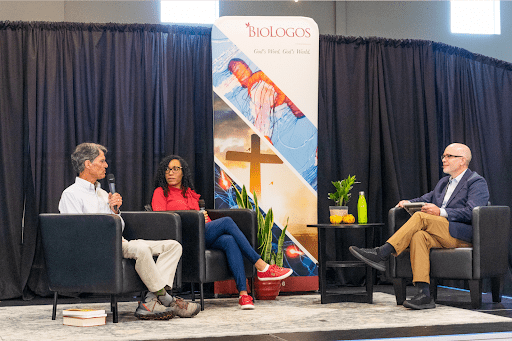
Integrate Curriculum Explores the Intersection of Science and Faith
As our children advance into more challenging subjects in their teen years, we as parents can struggle to address their questions. We desperately want to prepare them to hang onto their faith in an increasingly secular world, but we don’t feel equipped to adequately answer their concerns. No matter what learning environment your children are about to emerge from, they will soon face perspectives that will challenge their beliefs.
As our young adults become their own thinkers and encounter ideas that differ from what they’ve been raised to believe, we as parents can become paralyzed by fear. Will these conversations and subjects, particularly the sciences, damage my child’s faith in God?
As 1 John 4:18 says, “There is no fear in love. But perfect love casts out fear.” God’s love is bigger than our fears. It empowers us to move from a position of anxiety into a position of strength. As our children begin to ask questions, we have an opportunity to engage those questions, within the context of Scripture, and help guide them into a deeper, richer experience of God and the world God created.
It can be daunting, however, to take on these contemporary issues. There are hard questions about the world, and there are not often easy answers to those questions. Questions are not the enemy. We want our children to be able to think critically about their faith and whatever other topic they encounter, in the sciences or elsewhere. God is the giver of all truth, knowledge, and wisdom, and our students should feel empowered and confident to bring their faith into all areas of study.
BioLogos’ Integrate: Supplementary Science Curriculum from a Biblical Worldview
To make the exploration of science and faith less daunting for parents and teachers, BioLogos has developed a curriculum that brings “Christ-centered faith, rigorous science, and gracious dialogue to your students.”
BioLogos “explores God’s Word and God’s World to inspire authentic faith for today.” It is an organization made up of scientists who are also Christians, and theologians who value science. Together, they have a vision of “science and faith working hand in hand.”
BioLogos was founded in 2009 by Francis Collins, one of the leading biologists in the world. For years now, BioLogos has cultivated healthy dialogue between scientists and theologians. Meanwhile, many parents and teachers have been asking for material that could be adapted for a younger audience, to help bridge the gap between science and faith in the classroom for their children.
Integrate, a 15-unit supplementary science curriculum, is the result of three years of research and writing to address many of the most challenging contemporary scientific questions through the lens of our Christian faith. It is a resource that empowers parents and teachers to address these topics now instead of leaving our young adults to try to process them alone later, potentially outside of the support of a caring and informed Christian community.
Integrate is designed to be paired with the top biology textbooks to offer Christians a lens through which to engage with the most compelling theological and ethical questions of our modern world. The units cover general science and faith, origins, medical science, bioethics, race, and creation care. Material in Integrate is geared toward high schoolers for classrooms or homeschool educators, but it could be used by any Christian parent who may want to supplement what their child is getting in their classroom setting.
Meet, Grow, Engage, Experience, Integrate
The content in each unit is designed to be something you can open and run with; you don’t have to be a scientist or a theologian for the material to make sense. Each unit in Integrate’s curriculum includes five modules: Meet, Grow, Engage, Experience, and Integrate.
In Meet, students will hear from practicing scientists who are also Christians through a video interview and discussion questions.
The Grow module focuses on a Christian virtue that pairs well with the subject of the unit. For example, in the unit on genetic diversity and human dignity, the virtue is “compassion” and the importance of understanding other people’s experiences as different than yours.
The new material about the unit’s subject is presented in the Engage module, and an application of that new concept is practiced in the Experience module. If the subject of the unit was biodiversity, for example, a student might be prompted to go outside and see how many species of animals and plants they can see just in their own backyard.
Finally, the Integrate module is an opportunity to assess what the student has learned from the unit. There are no quizzes or tests built into the curriculum, so this module addresses the outcomes of what has been studied and how they might be put into practice. Say, for example, that in unit 13 on loving people by loving creation, you’re talking to your grandmother about a creek restoration project and Grandma says, “Why bother? Jesus is going to return soon anyway.” The student is asked to consider how they will respond to Grandma using the knowledge they’ve gained and the virtues they’ve practiced in this unit.
Curriculum Under the Big Tent of Christian Viewpoints
While BioLogos itself sees harmony between our faith and the scientific study of origins, the material in Integrate is presented in such a way as to respect the variety of Christian viewpoints. Students should be aware that there is diversity even within the body of Christ around scientific subjects, and yet we all love Jesus and can come to the table together. Jesus repeatedly called us as his followers to be united, “I will remain in the world no longer, but they are still in the world, and I am coming to you. Holy Father, protect them by the power of your name, the name you gave me, so that they may be one as we are one” (John 17:11 NIV).
In the coming years, BioLogos will be working to adapt the Integrate curriculum into many different forms. They are currently in the process of developing professional development resources, such as in-service days, virtual office hours, webinars, and an online community forum where teachers and parents can dialogue about the intersection of science and faith. The curriculum will also be adapted for adults who want to learn more about how science and faith can live in harmony, through Bible studies and an online course.
Learn more and explore the variety of topics covered in the Integrate curriculum by visiting the BioLogos website.





 Copyright
2024
Root and Vine
Copyright
2024
Root and Vine